Moscow Business Forum and Rosswift AGM bring together over 400 participants under the theme “Innovating today for a stronger future”
The seventh Swift Business Forum in Moscow took place at the Lotte Hotel on 12 April 2016. Organised for the third year running in conjunction with the ROSSwift (Russian national Swift member and user group) Annual General Meeting (AGM), the event attracted over 400 delegates, a turnout that clearly reflected Russia’s position as Swift’s second largest user community.
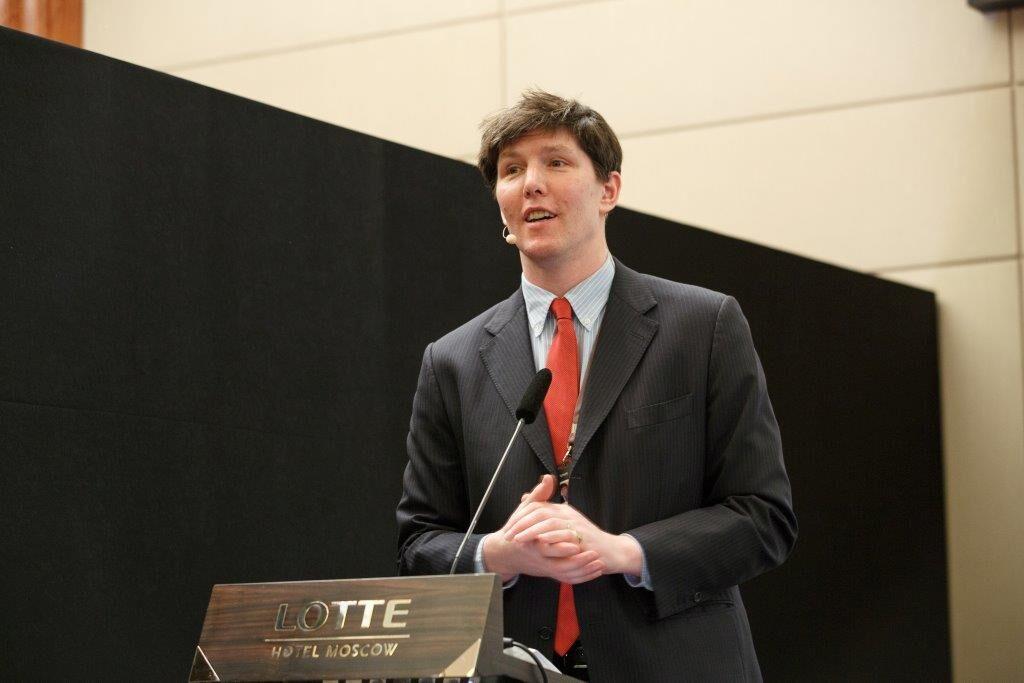
The busy agenda for the day kicked off with welcome remarks by Matthieu de Heering, Head of Russia, CIS and Mongolia, Swift and Natalia Dirks, Chairperson of the Rosswift Steering Committee. De Heering started off by paying tribute to the successful work in the past year of Rosswift distributing the KYC Registry in Russia, with the endorsement of the Bank of Russia. As a result, Russia is today one of the leading countries in the adoption of the Registry, with over 70 very active participants. Another achievement of the Russian Swift community in the last year has been the registration and publication of new ISO 20022 messages on currency control. Lastly, de Heering talked about the Innotribe Startup Challenge. Launched in 2011, the Challenge has become one of the leading global startup competitions, connecting the financial services industry with more than 650 FinTech startups around the world and reaching over 4,000 audience members through global showcases and networking events. The Startup Challenge has evolved over time and now supports emerging FinTech ecosystems, moving from a global competition to a multi-local programme supporting innovation where demographic trends, economic growth and regional integration projects are creating fertile ground for new technologies to emerge. In recognition of the vibrant FinTech environment in Russia, de Heering announced: “I am delighted to announce that Swift will run an Innotribe Start-up Challenge in Russia in 2017!” Finally, he thanked the event’s sponsors, Fiserv and FTC (ЦФТ), as well as Alliance Factors, Swift’s business partner in Russia, CIS and Mongolia.
I am delighted to announce that Swift will run an Innotribe Start-up Challenge in Russia in 2017!
Taking over from de Heering, Natalia Dirks welcomed the audience on behalf of the Rosswift steering committee to an event that she said has become not only a tradition but also a fixture in the Russian financial industry calendar. She proceeded to introduce the members of the praesidium - Alla Bakina, Head of Payment System Department, Central Bank of Russian Federation; Eddie Astanin, Chairman of the Executive Board, National Settlement Depository and Swift Board Member; Anatoliy Aksakov, Deputy head of Duma financial markets committee, The State Duma and Roman Chernov, Executive director, ROSSwift – before handing over to Gottfried Leibbrandt, Chief Executive Officer, Swift for his CEO update.
Focus on the core, prepare for the future

Leibbrandt opened his speech saying what a pleasure it was to be back in Moscow and at the 4th Moscow Business Forum in his role as CEO of SWFT. He then paid tribute to the great relationship between Swift and the Russian financial community, before going on to give a brief overview of Swift’s performance in 2015, which, he said, was a very good year in which the cooperative did well along the 3 key dimensions of usage, operational excellence and renewal. He also stated that the company had done well on the pick-up of new services such as Compliance services, Business Intelligence and SwiftRef. He thanked the Russian community for its support in this area, with particular reference to The KYC Registry adoption rates. Moving on to the future, he defined the Swift 2020 strategy a “sound strategy” and expressed his confidence that Swift can execute and deliver on what is set out therein. He did, however, clarify that it would not be without challenges and explained that cyber threats, geopolitics and disruptive innovation are all things that keep him awake at night and that we all have to contend with. One area where this is clearly visible is the payments markets. Using research that shows the state of play in both domestic payments and international payments, he went on show how various different segments – high value payments, cards, cheques and ACH payments - have evolved over time and how, despite volumes increasing, the average value of transactions going across any given system has not changed in any significant way over time. “The successful new entrants thus far have exploited the gaps in the segmentation,” he said, “and haven’t tried a one size fits all approach.” What this means, he proposed, is that design becomes much easier if you are clear about the segment you are serving. “Innovation has to be targeted, one size does not fit all,” he stated. “That doesn’t mean that what works for a segment today isn’t unchallengeable,” he continued, “all of the segments are challengeable – and a lot of effort and money is going into disrupting each of them.”
Innovation has to be targeted, one size does not fit all. That doesn’t mean that what works for a segment today isn’t unchallengeable. All of the segments are challengeable – and a lot of effort and money is going into disrupting each of them.
Swift is already taking actions in some areas to address this and is active in real-time payments with the Australia New Payments Platform. Another area that it is addressing is that of correspondent banking, with the global payments innovation initiative, a project that aims to transform existing practices in correspondent banking and marks an important step towards banks being able to deliver of cross-border payment services with greater speed, transparency and predictability to their corporate customers. Drawing his speech to a close, he assured delegates that the years to come will certainly not be dull, but that Swift’s main focus will of course remain the efficient running of its core business, for the benefit of the community.
Rosswift Annual General Meeting
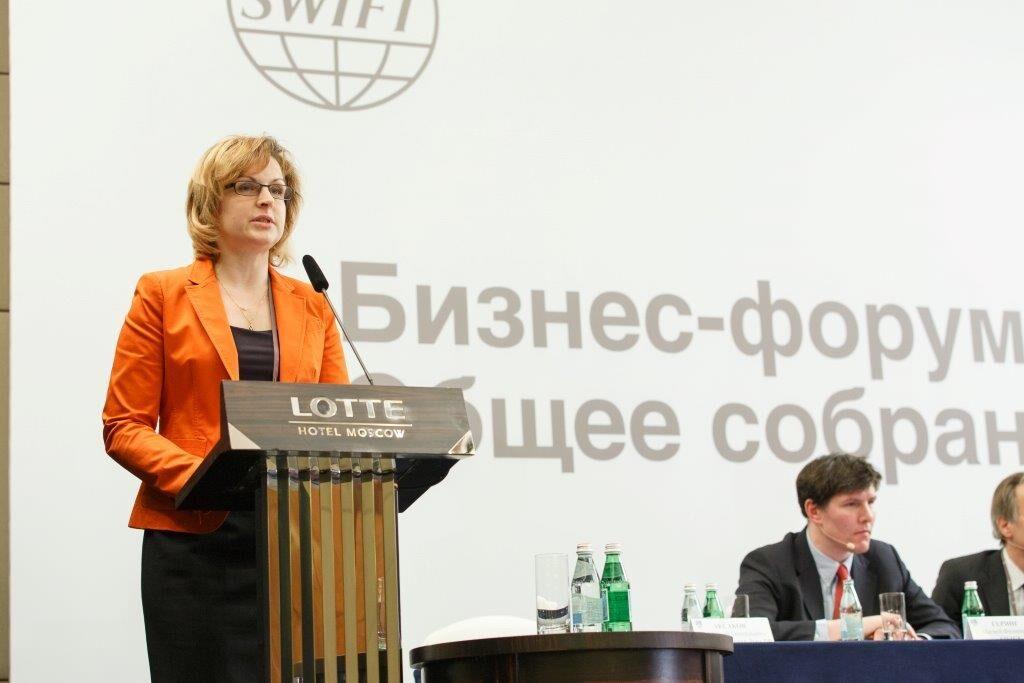
Upon conclusion of the Swift CEO update from Leibbrandt, Dirks officially opened the Rosswift AGM. Alla Bakina delivered an update from the Bank of Russia in which she stressed that “International standards are of critical importance.” She also stated that the Bank of Russia has launched a working group to look at new trends and technologies and the activities and solutions of leading start-ups, and assess how new technologies, blockchain in particular, can be used to improve the quality and accessibility to the financial market. The new Rosswift charter was presented by a representative of Rosswift’s Executive Committee, who encouraged members to read the 123 page document very carefully as it sets out all aspects of the Rosswift organisation in detail. Next on stage was Eddie Astanin, who one year from his election as the Russian representative on the Swift board, gave some insights into the functioning of the board and of Swift in general. He stated that there are great benefits for Russia in being directly involved in the Swift governance process, which gives it first-hand access to information and a closer collaboration with the cooperative and its executives. The direct dialogue that results from his, he explained, has helped to deal with geopolitical tensions and political risks and led to a current situation that both the Bank of Russia and Swift are comfortable with. Astanin went on to explain that the activities of Innotribe, the Swift Institute and the FinTech world are debated widely within Swift and on the Swift board, and there are many synergies, as well as direct communication on such current topics. “I am very impressed with the work of the Swift board and with how effective it is. It is impressive in its logistics, in the way in which information is disseminated and in the levels of professionalism with which its activities are conducted. It is great that our community is now a part of it and that we have direct communications with Swift management and the Swift community. I think there is real value in this collaboration,” he concluded.
International standards are of critical importance.
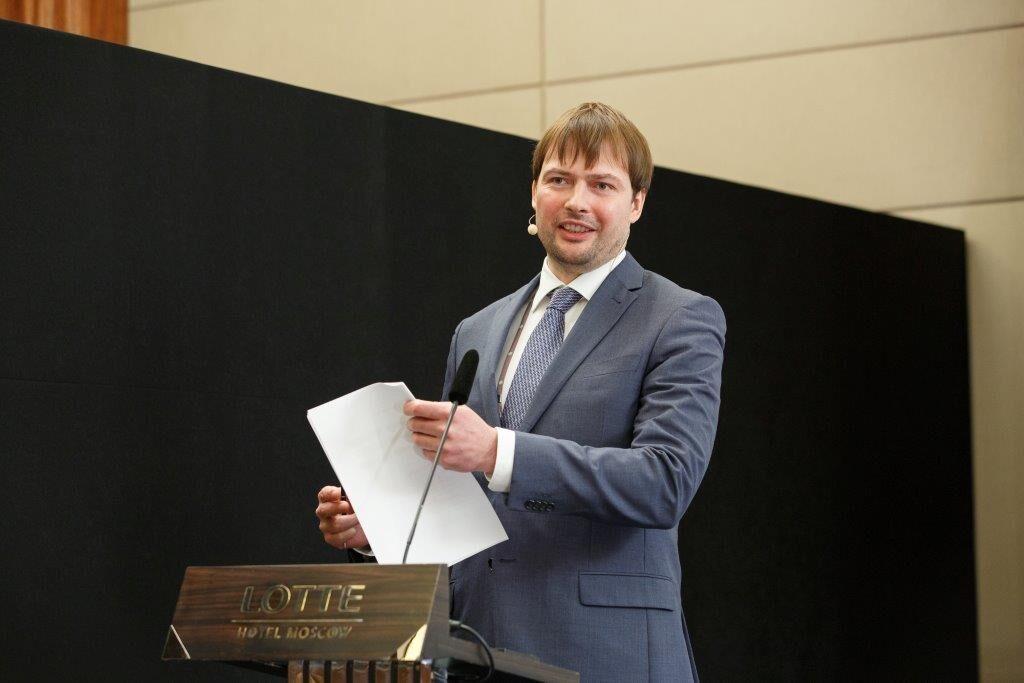
I am very impressed with the work of the Swift board and with how effective it is. I think there is real value in this collaboration.
Last to present in the Rosswift AGM was Roman Chernov, whose mandate was confirmed as Executive Director of Rosswift and who presented the Rosswift 2020 concept paper, the 5 year plan for the Russian Swift community that goes hand-in-hand with the Swift 2020 strategy. “In the next five years, Russia will consolidate its move from a ‘Swift consumption model’ to a model of shared experience,” he stated, explaining Russia’s ambition to play a greater role in how Swift standards, products and services are shaped, rather than just using them when they come to market. What Rosswift has done, he explained, is take the key elements of the Swift 2020 strategy, select what is relevant for Russian users and then describe each of these areas in detail, giving a proposed plan for the Russian community.
In the next five years, Russia will consolidate its move from a ‘Swift consumption model’ to a model of shared experience.
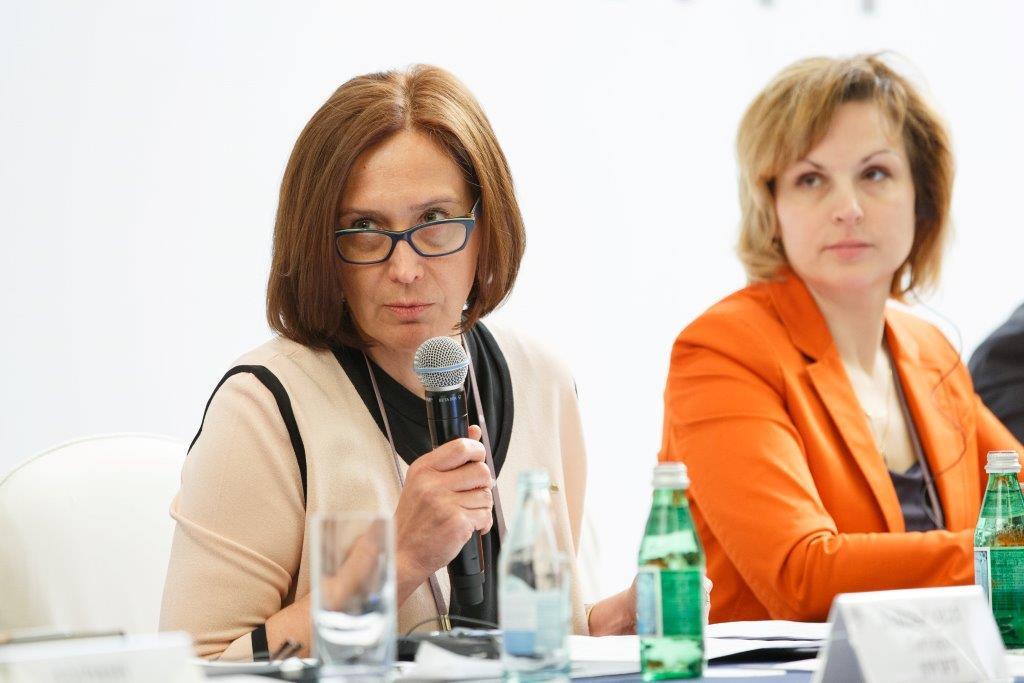
Swift Traffic and Pricing update
Next on the agenda was an update on Swift traffic and pricing by Andre Boico, Director, Pricing, Swift. Boico started by running though some key figures for Russia’s traffic on Swift: 251+ thousand FIN messages per day (YTD Feb 2016), 70+ million FIN messages per year (2015), 84% Payments traffic in total FIN traffic (YTD Feb 2016), 10% Securities traffic in total FIN traffic (YTD Feb 2016) and 4000+ FileAct Live Traffic in Kchar per day (YTD Feb 2016). Looking at global Swift traffic, Boico explained that year to date growth for payments stands at 4.7%, which is good but slightly below forecasts and reflects a minor slowdown in the global economy. On the securities front, despite representing only 10% of its total FIN traffic on Swift, Russian securities traffic is performing better than average and has seen a very good start to the year. This securities FIN traffic growth comes on top of a backdrop of negative overall growth in traffic in Russia, due to macroeconomic factors and other reasons. Beyond the world of FIN, both InterAct and FileAct are both growing very fast, albeit from a low starting point, with growth rates in excess of 30%, which represents a major development.
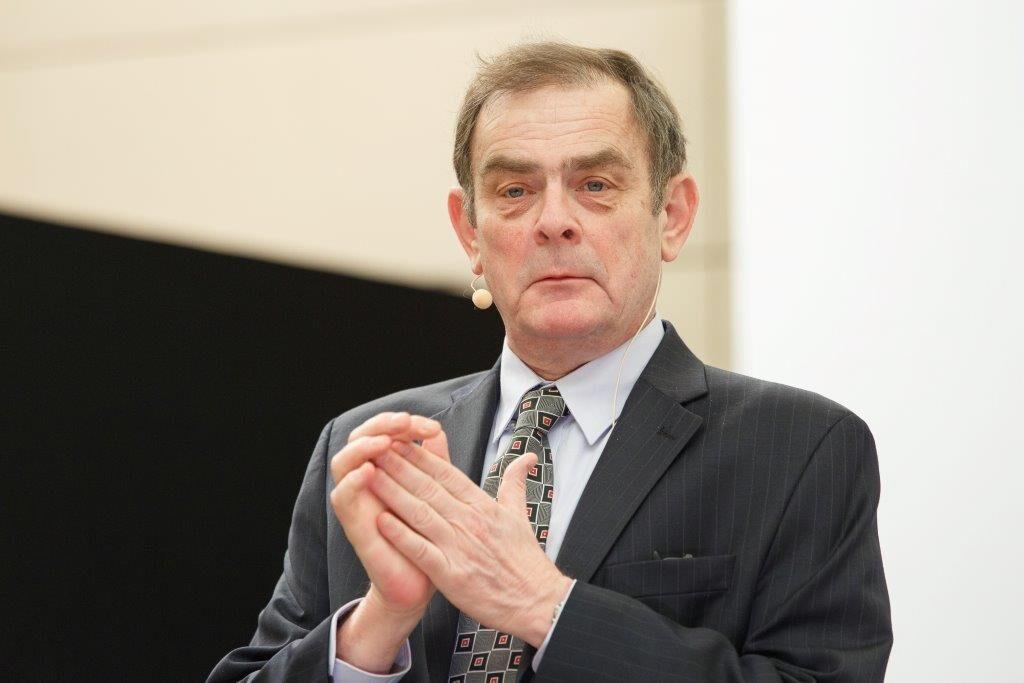
Community deals are not done often. We only propose them when we see a big need and great potential.
Moving on to speak about pricing, Boico stated that as part of the Swift 2020 strategy, the cooperative has committed to price cuts of 30-50% over 5 years. This comes on top of the 57% cut that was achieved in the 5 year period from 2010 to 2015. In the specific case of Russia, over the period 2006 – 2015, traffic increased by 420%, whilst the countrywide total messaging fees paid stayed almost flat. In the last section of his presentation, Boico announced and explained a community pricing deal for Russia that aims to boost Russian domestic traffic on Swift and provide cash flow predictability by giving the community access to a whole new price grid if it grows traffic by 30% over a 12 month period. “Community deals are not done often. We only propose them when we see a big need and great potential,” stated Boico, commenting on the proposal. Alexey Maslov, the Swift User Group Chairperson for Russia, accepted the proposal on behalf of the Russian Swift community and thanked Swift and the banks involved in the proposal building process for their hard work.
Facing the compliance challenge
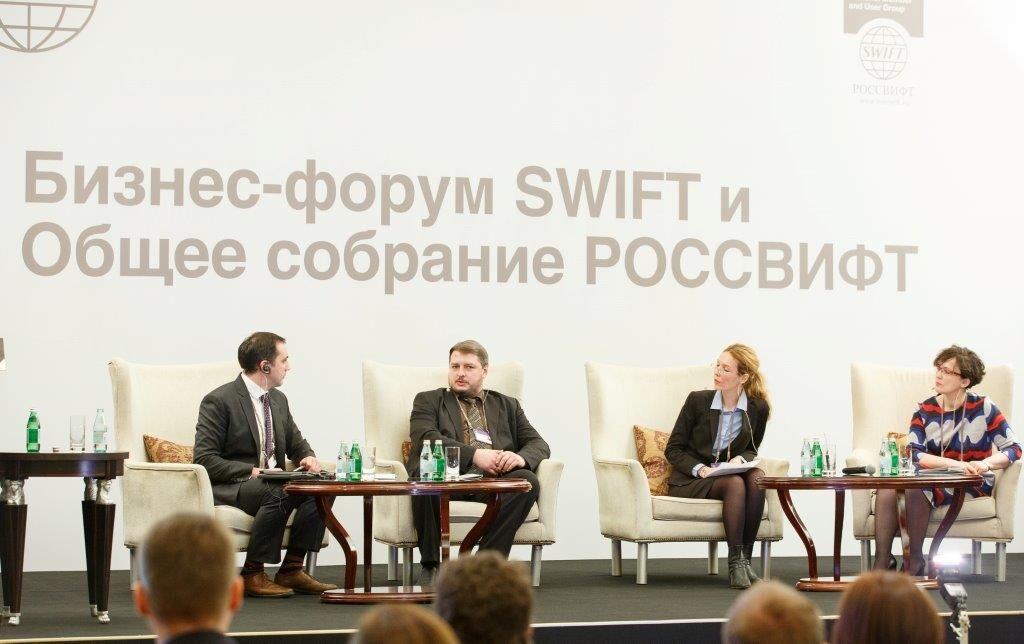
Compliance was up next, with a panel discussion on challenges and solutions in anti-money-laundering and combatting. To discuss the topic were Andrey Emelin, Chairman, NCFM, Larisa Zalomikhina, Head of Compliance, Sberbank, Maria Shalimova, Head of AFC, Deutsche Bank Moscow, and Julien Laurent, Head of Compliance Solutions, Financial Crime Unit, Swift, who moderated the session. Talking about Swift’s KYC Registry, Shalimova stated that Deutsche Bank uses the Registry in 62 countries and finds it a very useful tool, especially given that transparency is one of the key requirements that is being addressed nowadays. Emelin explained that in some instances it is a still a struggle to get access to what is essentially very basic information and that significant improvements are required in this area, in particular when it comes to the information flows with some government agencies. Movement in that direction, he said, will be beneficial to the community and improve efficiency. Furthermore, compliance with international standards and may even go beyond, given the extent of what the government information system can actually offer.
Swift’s KYC Registry allows a bank to access information declared by financial institutions by their own initiative which would otherwise not be accessible, so this represents a great advantage
Asked by Laurent whether Swift should be providing more information for local jurisdictions, Shalimova replied that it would indeed be very useful if the Registry could be made more local and allow for local specifications in addition to complying with international standards. Emelin raised the issue of the collection of certified documents which is, he stated “a painful process.” Despite some steps having been taken recently to address this, progress is slow, he explained, and all reforms to existing practices need to be addressed within the legal framework, which takes time. “We are making every effort in expert groups and sub-groups to improve matters,” he said. “Draft laws are one aspect but it’s a permanent process that takes time, effort and active involvement.” Taking over from Emelin, Zalomikhina stated that “Swift’s KYC Registry allows a bank to access information declared by financial institutions by their own initiative which would otherwise not be accessible, so this represents a great advantage.” Furthermore, this approach is in accordance with the standard proposed by the OECD. Closing with comments on next steps, Shalimova proposed that the next step is the risk-based approach, after which comes the outcomes-based approach and a move from being reactive to proactive, a journey on which Swift clearly has the experience to accompany the community.
The future of the Russian payments system
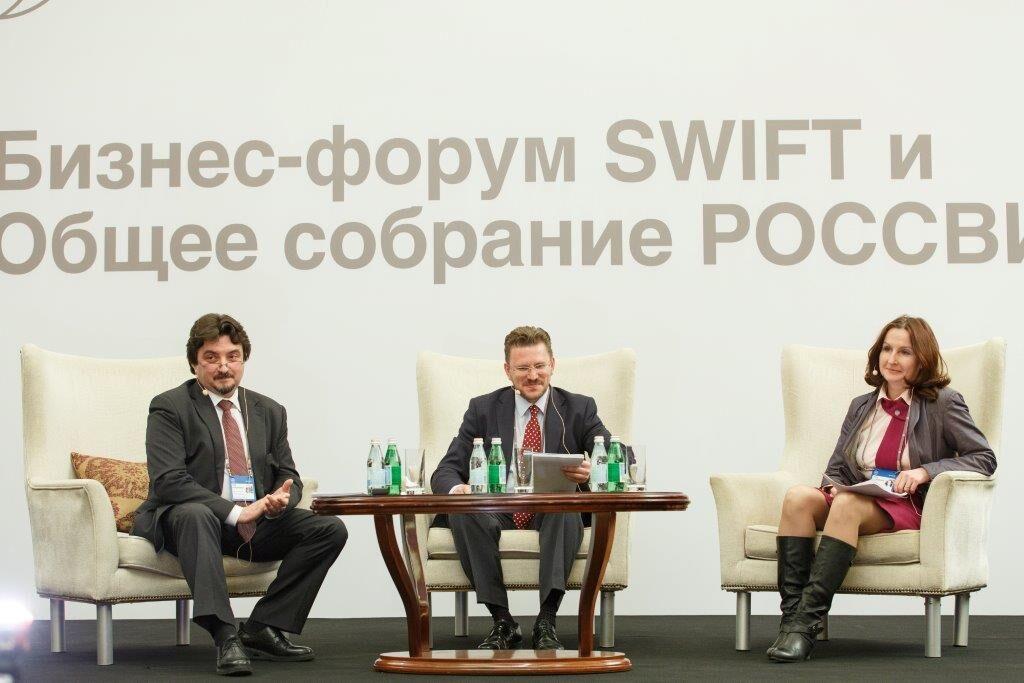
Resuming after lunch, the audience split into two groups for an update on either the payments market or the securities market. The payments session saw Alexey Maslov, Swift UGCP in Russia and Deputy head of JCB Eurasia joined on stage by Oleg Perestenko, Deputy head of payments system department, Central Bank of Russian Federation and Larisa Milovskaya, Head of Settlement, B&N Bank. Perestenko gave a comprehensive overview of the development of the current and future payment system of the Bank of Russia, explaining that whilst the current payment system is still developing to address the needs of the industry, “the prospective payment system of the Bank of Russia, based on ISO 20022, will be launched in 2018.” The initial pool of banks to start the migration will be created in Q4, 2017 and the documentation will be ready in Q4, 2017, he explained. “Switching to technologies of the future will give maintained efficiency and resilience and ensure the synchronisation of urgent and non-urgent services working real-time, 24/7,” he stated.
The prospective payment system of the Bank of Russia, based on ISO 20022, will be launched in 2018.
Milovskaya started her presentation by running through the trends that can currently be observed in the market: stagnation of the Russian economy and a consequent decline in industry and the banking sector; restriction to access to long-term sources of funding, leading to a liquidity shortage; some credit institution licenses revoked; struggles for new niches; decreasing profit margins; impact of regulatory actions and the new Basel agreement; high exchange rates and stricter regulation in retail lending and banking operations. In this context, she said, banks should adjust their strategies and banking models and seek out new customers rather than trying to enter new areas of activity, consider consolidation to ensure that Russia’s banks become more universal, cover more markets, more customers, invest in new technologies, improve the quality of their services and reduce costs. In the area of cost management, she set out a series of options, including outsourcing, the centralisation of functions such as settlement, correspondent accounts and data management and improved liquidity management. “I applaud the successful cooperation between Swift and ROSSwift and the commitment of both to help banks lower costs and increase efficiency,” said Milovskaya, bringing the session to an end.
I applaud the successful cooperation between Swift and ROSSwift and the commitment of both to help banks lower costs and increase efficiency.
A new age for corporate actions
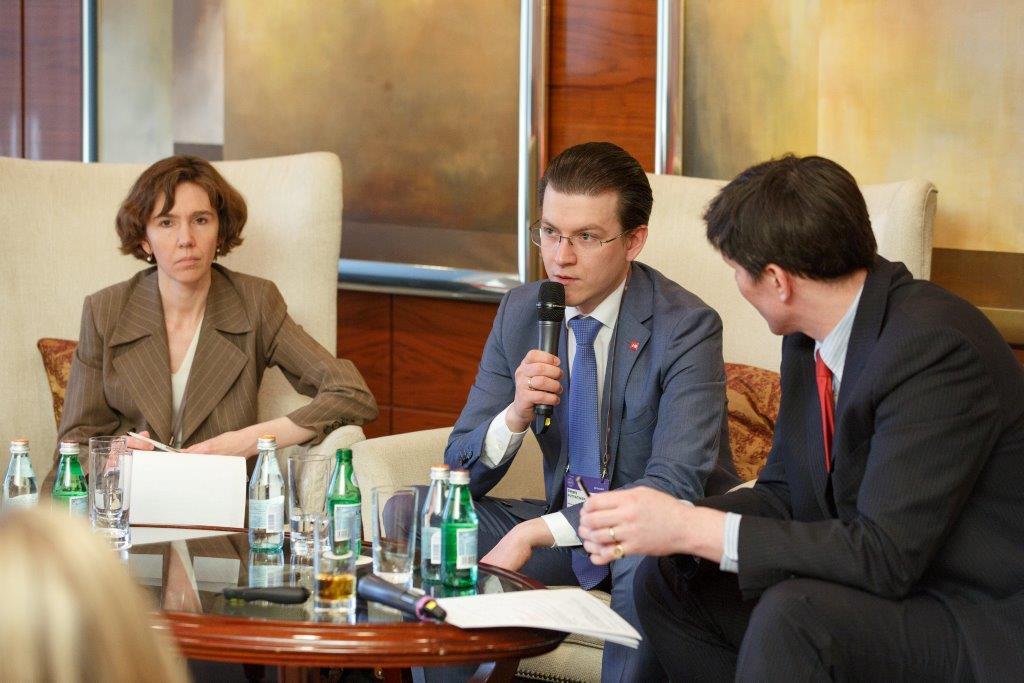
The securities update was given by Sergey Putyatinskiy, CIO, National Settlement Depository and Olya Petrova, Head Product Management, Direct Custody and Clearing, Citi Moscow, in a session moderated by de Heering. The main topic up for discussion was NSD’s Corporate Actions (CA) Reform programme, which started in 2014 and is still on track to conclude at the end of 2017. With CA announcements on ISO 20022 already a reality at NSD, the next steps are digitising the entire CA business process, Putyatinskiy reported. Talking about the ambitious timeline for the reform, he said that DTCC were impressed when they shared their implementation timeline with them. On the matter of the use of Swift as a channel, Putyatinskiy explained that whilst all messages are currently not on Swift, “Swift is the only planned STP channel as NSD moves away from Luch. We are happy with the close collaboration with Swift and its Standards department on what is ISO-mappable, with or without change requests, and what isn’t and never will be,” he added.
Swift is the only planned STP channel as NSD moves away from Luch. We are also very happy with the close collaboration with Swift and its Standards department on what is ISO-mappable, and what isn’t and never will be.
The extent of the programme’s importance for market participants was confirmed by Petrova, who said that the project is the major development programme for Citi Moscow in securities, just like it is for NSD. Paying tribute to the objectives of the programme, she concluded the discussion by saying that “the real measure of NSD’s CA reform programme’s success is that it makes life simpler for everyone along the chain, especially the end investor.”
Fintech and innovation: From disruption to real world change
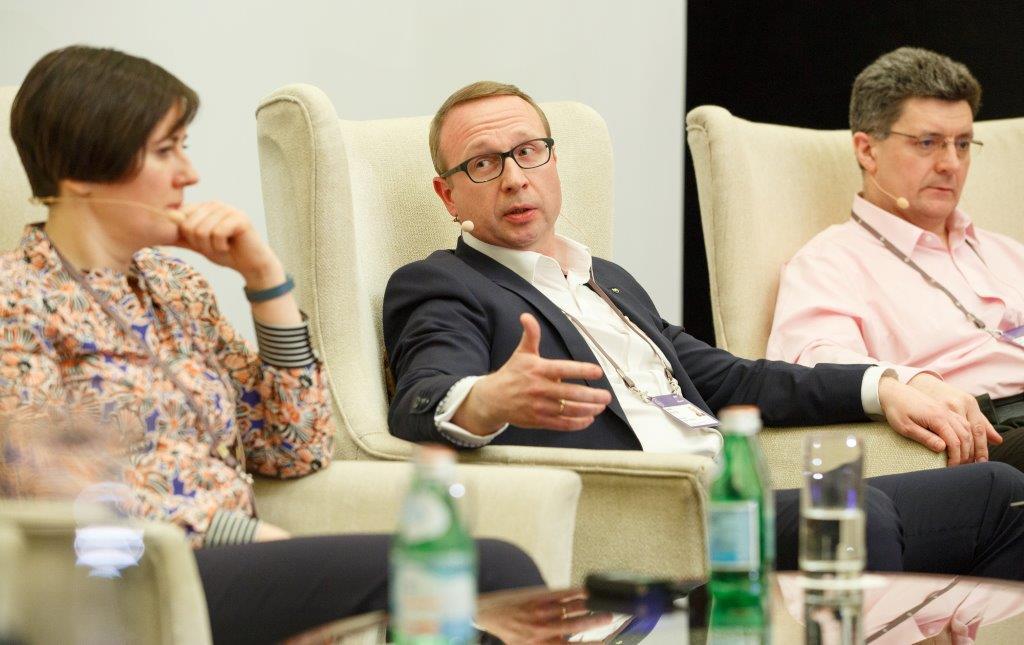
Expectations are high but a reality check and maturity are needed, as well as clear business use cases and concrete benefits.
Last but certainly not least, was a session on innovation and developments in financial technology. To evaluate the impact of both on the future of our industry were and the discuss the topic were Ekaterina Frolovicheva, Innovation block, Sberbank, Vadim Kotov, Chief Technology Officer (CTO), CIB, Sberbank, Artem Duvanov, Chief Architect, NSD, Stanley Wachs, Senior Manager Global Payment Innovation, Swift and Damien Vanderveken, Head of Swift R&D, Swift. Wachs opened with some key figures about the levels of investment in fintech, which have gone from USD 3bn in 2013 to USD 12bn in 2015. He explained that in this environment, we cannot stand still and we need to evolve and innovate as a community. Swift is already active in real-time payments and in the correspondent banking area, where it has launched the Global Payments Innovation initiative (gpii). As explained earlier in the day by Leibbrandt, the gpii aims to address the current service level issues in this area and dramatically improve the customer experience in cross-border payments. To date, 52 banks have signed up for the initiative, representing 70% of cross-border payments traffic on Swift. Amongst these is Sberbank. The pilot phase is scheduled for 2016, with early result expected by Sibos Geneva. The objective is to show that the financial industry can be agile and respond quickly to the challenges that it faces, all whilst exploring further long-term changes, such as the use of new technologies.
We like how the gpii project is being run, and look forward to the opportunity to influence and exchange knowledge with other banks.
Following Wachs’ presentation on gpii, Vanderveken gave the results of Swift’s research on and assessment of blockchain, or distributed ledger technology (DLT) as it currently stands. He explained that the technology was originally developed for a customer-to-customer or business-to-customer environment, rather than for business-to-business. In order for it to be made relevant and useful for the financial industry, it will be necessary to institute an administrative role and define the rules of the game. Having given a factual assessment of all of the challenges, he said that a lot of effort will have to go into solving them, but that the technology does offer some clear opportunities, such as traceability, information propagation and the potential for application beyond payments. Summarising Swift’s position, he stated that the technology has a lot of potential, can and probably will have applications in the financial industry but is not yet mature. “Expectations are high but a reality check and maturity are needed, as well as clear business use cases and concrete benefits,” he concluded.
Proxy voting is a use case where blockchain really generates value.
In the panel discussion that followed, Kotov stated that whilst all of the DLT talk is terribly exciting, he is of the view that the financial industry should focus on use cases. On gpii, speaking on behalf of Sberbank and explaining why they have joined the initiative, he said: “We like how the project is being run, and look forward to the opportunity to influence and exchange knowledge with other banks.” Duvanov gave some very interesting insights into the work that NSD has been doing with DLT: a proof of concept prototype that the CSD has already completed for proxy voting, using ISO 20022 formats reviewed by Swift. “Proxy voting is a use case where blockchain really generates value,” he said, before going on to explain that whilst they already have plans to look at other use cases and work with the Bank of Russia on some of these, they don’t expect to see any serious implementations on blockchain for at least another two years. Frolovicheva agreed with this position, explaining that in her view it will probably be 3 to 5 years before we see wide adoption and that in the meanwhile, what we are likely to see are 20-40 early adopters, probably using private DLTs but with no interoperability with others. In her final remarks, she went on to say that each bank needs to find a way to advance with fintech. The models vary and there is no single universal recipe. For Sberbank, partnerships work well, alongside investments, investment in internal labs and a top-down mandate to look at future technology whilst running current systems. “If you aren’t already doing it, you should really get it on your agenda in the next 12 months or so, or someone else will eat your piece of the pie,” she said to the audience. Kotov expressed the view that at some point the competition and collaboration between the fintech companies and the banks will develop into more of a fight and both must change. “Banks need to become more flexible and more hungry, whilst fintech companies will need to become more like banks to survive,” he said, “because at some point regulators will intervene, customers will have to be acquired and processes will have to be implemented. Closing the session, Duvanov used the example of Apple and the advent of the iPhone to explain that new technologies never do what current technologies do. “DLT enables us to do things that we didn’t do before. Look at the iPhone. It catered for a need that we didn’t even know we had. This is what we do on a routine basis, this is the essence of our business,” he stated.
In summary…
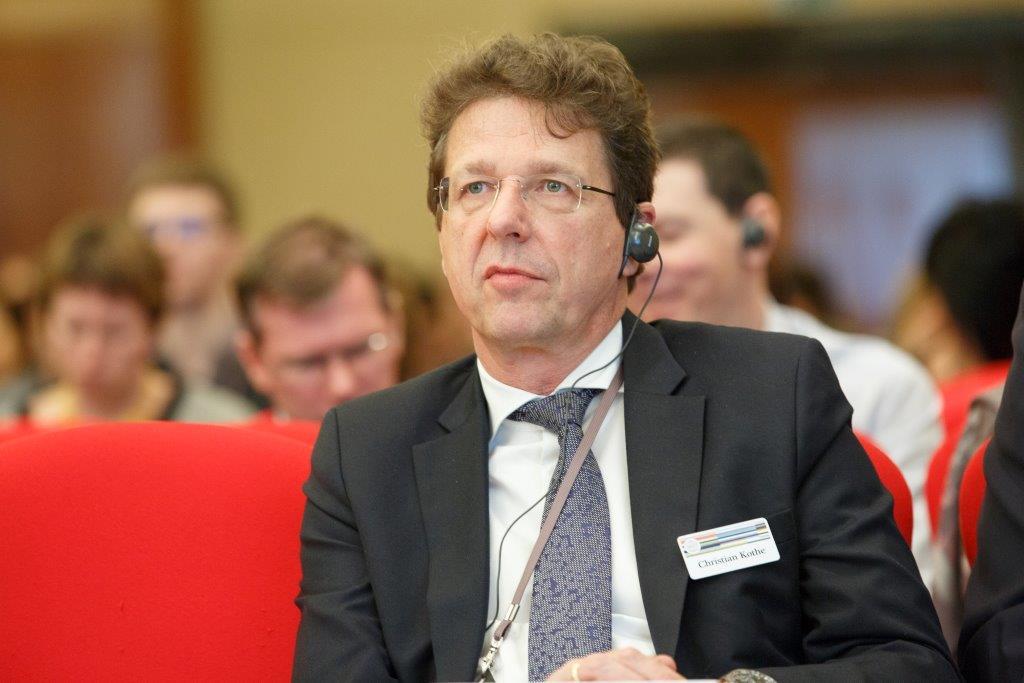
Summing up the day, Christian Kothe, Head of Central and Eastern Europe, Swift, commented on the great turnout for the event and the high number of people still present at the end of the day. On fintech and innovation, his message to the audience was “no ignorance please.” “Companies that don’t take competitive developments seriously go out of business or struggle to survive,” he went on to say. “There is strong engagement of the Russian community with Rosswift, its user groups and Swift. I really encouraged banks to read Rosswift’s 2020 concept paper carefully: everyone has to contribute for everyone to benefit,” he then said, praising the interaction between the Russian community and Swift. On the pricing proposal presented by Boico earlier in the day, he urged the Russian community to embrace the effort made by Swift to help Russian banks foster and leverage their Swift connection more. “Everyone has to contribute for everyone to benefit,” he said. Kothe closed the forum by reiterating Swift’s commitment to the Russian market and thanking the delegates for their participation and dedication.
There is strong engagement of the Russian community with Rosswift, its user groups and Swift. I really encouraged banks to read Rosswift’s 2020 concept paper carefully: everyone has to contribute for everyone to benefit.
If you have any questions on the topics covered in this article, please contact the Swift Moscow office: Moscow.Office.Generic@Swift.com.


